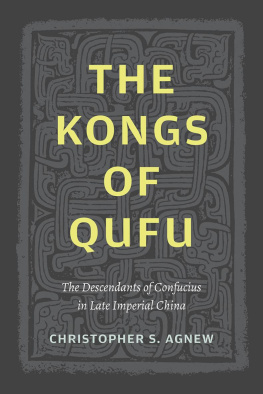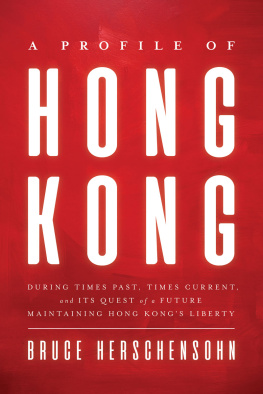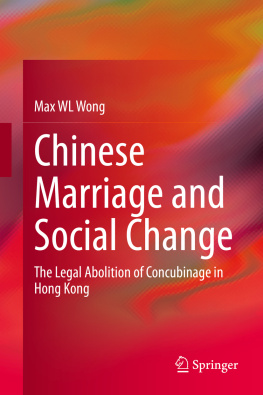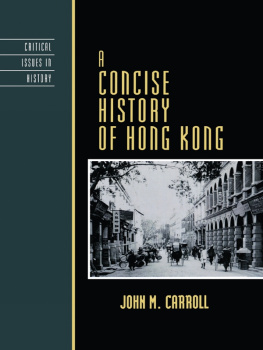THE KONGS OF QUFU
THE KONGS
OF QUFU
THE DESCENDANTS OF CONFUCIUS
IN LATE IMPERIAL CHINA
CHRISTOPHER S. AGNEW
UNIVERSITY OF WASHINGTON PRESS
Seattle
The Kongs of Qufu was made possible in part by a grant from the Department of History at the University of Dayton.
Copyright 2019 by the University of Washington Press
Printed and bound in the United States of America
Design by Katrina Noble
Composed in Minion Pro, typeface designed by Robert Slimbach
232221201954321
All rights reserved. No part of this publication may be reproduced or transmitted in any form or by any means, electronic or mechanical, including photocopy, recording, or any information storage or retrieval system, without permission in writing from the publisher.
UNIVERSITY OF WASHINGTON PRESS
www.washington.edu/uwpress
LIBRARY OF CONGRESS CATALOGING-IN-PUBLICATION DATA
Names: Agnew, Christopher S., 1976 author.
Title: The Kongs of Qufu : the descendants of Confucius in late Imperial China / Christopher S. Agnew.
Description: Seattle : University of Washington Press, [2019] | Includes bibliographical references and index. |
Identifiers: LCCN 2018060330 (print) | LCCN 2019002610 (ebook) | ISBN 9780295745947 (ebooks) | ISBN 9780295745923 (hardcover : alk. paper) | ISBN 9780295745930 (pbk. : alk. paper)
Subjects: LCSH: Qufu Shi (China)History. | Qufu Shi (China)Politics and government. | Qufu Shi (China)Social conditions. | NobilityChinaQufu Shi. | KinshipChinaQufu Shi. | ConfuciusFamily. | ChinaHistory9601644. | ChinaHistoryQing dynasty, 16441912.
Classification: LCC DS797.72.Q487 (ebook) | LCC DS797.72.Q487 A46 2019 (print) | DDC 951/.14dc23
LC record available at https://lccn.loc.gov/2018060330
Cover design by Katrina Noble
Cover illustration: Bronze ritual vessel (gui) with design of dragon. Early Spring and Autumn Period.
The paper used in this publication is acid free and meets the minimum requirements of American National Standard for Information SciencesPermanence of Paper for Printed Library Materials, ANSI z39.481984.
For Junko, without whom this book would never have been completed, and for Saya and Leon, who made it take so long
CONTENTS
ACKNOWLEDGMENTS
First, I would like to thank the sources of financial support that made this book possible. In Seattle I was critically supported by the Henry Jackson China Studies Fellowship, the Chester Fritz fellowship, and the K. C. Hsiao Fellowship for China Studies. Additional research funds were provided by the University of Daytons Department of History, the University of Dayton Research Institute, and the Center for International Programs Global Education Fellowship. Thanks to the staff at Qufu Normal Universitys International Exchange Center during my stays there in 2002 and 2003. I would also like to thank Wang Weiping, Wei Jia-Jia, and the rest of the staff of University of Daytons China Institute in Suzhou, where I spent the last few summers finishing this book.
I am indebted to the many people who read the manuscript in whole or in part over the years. In Seattle, thanks particularly to R. Kent Guy, Patricia Buckley Ebrey, and Madeleine Yue Dong for their help and advice in the early stages of this work. Thanks to Susan Naquin both for her comments and her encouragement. Parts of the book have been presented over the years at meetings of the Association for Asian Studies, the Midwest Conference on Asian Affairs, and the University of Washington Qing History Conference, and comments received in those fora have been very helpful. Thanks to Ramzi Rouighi for reading early drafts of this work and for our discussions over afternoon coffee. My colleagues at the University of Dayton have patiently read and commented on chapters presented at our departmental colloquia over the years. Special appreciation to Paula Braley who helped to proofread the manuscript. Finally, thanks to the two anonymous reviewers for the University of Washington Press, who suggested changes that greatly improved the final product.
I would like to acknowledge that chapter five includes material originally published in the Journal of Family History as Memory and Power in Qufu: Inscribing the Past of Confucius Descendants.
My wife Junko has been my strongest supporter, and without her help and her patience this project would have never been completed. For Saya and Leon, China has always been just something that takes me away in the summers, and I am thankful to them for the daily reminder that there are more important things in life than books.
CHRONOLOGY OF DYNASTIES
Shang | ca. 16001046 BCE |
Western Zhou | 1046771 BCE |
Eastern Zhou | 770256 BCE |
Spring and Autumn period | 770481 BCE |
Warring States period | 475221 BCE |
Qin | 221206 BCE |
Western Han | 202 BCE9 CE |
Xin dynasty | 923 CE |
Eastern Han | 25220 |
Three Kingdoms | 220265 |
Jin | 265420 |
Western | 265316 |
Eastern | 317420 |
Northern and Southern Dynasties | 420589 |
Sui | 581617 |
Tang | 618907 |
Five Dynasties | 907960 |
Song | 9601279 |
Northern | 9601127 |
Southern | 11271279 |
Jin | 11151234 |
Yuan | 12711368 |
Ming | 13681644 |
Qing | 16441912 |
THE KONGS OF QUFU
INTRODUCTION
Since the Han dynasty, there have been many who have governed districts and commanderies. Among the magistrates of Qufu, few have been removed for bribery and corruption. That this is so is not because the descendants of Confucius are uniquely virtuous, but rather because of the efficacy of the arrangement.
GU YANWU, ON THE PREFECTURE AND COUNTY SYSTEM
WRITING IN THE SEVENTEENTH CENTURY, THE GEOGRAPHER AND antiquarian Gu Yanwu (16131682) saw in the small county of Qufu in Shandong a model for the political reform of the Chinese state. Rather than maintain an apparatus that appointed county-level officials from the central government to manage fiscal and military administration in the localities, Gu envisioned a system in which literati elite would take over government administration in their home localities. County magistrates would be granted a great deal more autonomy than before, and, barring any problems, they could hold a post for the duration of their lifetime and bequeath it to their descendants. This proposal called for the decentralization of dynastic power and a reinvigoration of governing institutions at the local level that would strengthen direct elite control over the peasants who tilled their lands. The Kongs of Qufu, the recognized descendants of Confucius and guardians of his tomb and temple, had governed their home county for hundreds of years in such a way, with relative autonomy. Owing to the Kongs status as the descendants of the first sage himself, they were able to negotiate political and economic privileges that strengthened their control over local society. At the center of this influence stood the Duke for Fulfilling the Sage (Yansheng Gong), a title held almost perpetually by Kongs from 1055 to 1935.








